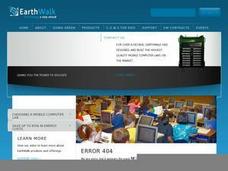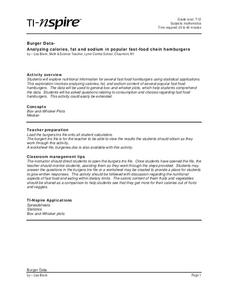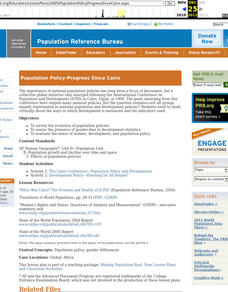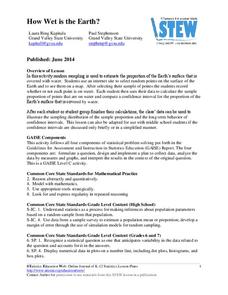Curated OER
Zoo Poo
Students use Internet research to determine the amount of carbon dioxide produced per unit energy for biomass and coal. In this alternative energy lesson, students research to find out how much energy and carbon dioxide several coal and...
Curated OER
Comparing the Health and Lifestyles of 13 Year-olds Around the World.
Eighth graders examine international data and statistics to evaluate the health and trends of 13 year old students around the world.
Curated OER
Children Just Like Me
Students study the issues and plight of the developing country of Bangladesh. In this developing country lesson, students study a fictionalized case with actual statistics to learn about issues facing children in the country of...
Curated OER
Rural-Urban Migration in the 1990's
Students consider the reasons why people relocate from one area to another. In this relocation instructional activity, students read an article that includes research and statistics on which age, education level, etc., of the population...
Curated OER
Randomness and Probability
In this statistics worksheet, 11th graders complete word problems by analyzing data given to them. They answer the probability of an even occurring and reasons it should occur. There are 16 questions on this worksheet.
Curated OER
Healthy Relations
Students draw on their own experiences with health care to create educational skits to better doctor-patient relationships. For homework, they create guidelines and write recommendations for an appropriate government role.
Curated OER
Distribution of children living at home
Students use E-STAT to examine demographics. For this social demographics lesson, students use statistical data to determine if a particular family is in need of assistance. Students will discuss social and educational policies and...
Curated OER
Slavery By The Numbers
Students connect episodes in the history of slavery with larger demographic trends. They locate statistical information using census data from the United States Historical Census Data Browser.
Curated OER
Science on the Skids
Students discuss the decline in the sciences in America by comparing statistics and information from the U.s. to other countries. Then they write and deliver a "State of the Sciences" address to their peers.
Curated OER
Trash a Pizza!
Students investigate data about America's trash production. In this environmental lesson, students use statistics about what we throw away to create an art pie chart project called a "trash pizza."
Curated OER
Cell Phones Create Dangers
Students research what laws, if any, relate to cell phones in your state and community. Students interview local law enforcement personnel to find out if cell phones have caused accidents in your town or city. Try to get statistics on...
Curated OER
Math: Football Fever Fun
Students compile statistics from high school or other football team and construct a spreadsheet on which to record their findings. Using Chart Wizard to analyze the data, they construct charts and graphs for a visual display of the...
Curated OER
Box-and-Whisker Plots
Students explore nutritional information for several fast food hamburgers using statistical applications. In this statistics lesson, students analyze calories, fat, and sodium content of various fast food restaurants. Students also...
Curated OER
Meaning of Alpha
students define the alpha level. In this statistics lesson, students identify what makes the "null rejected" and discuss the data surrounding the null. They observe the meaning of alpha as it relates to the bell curve.
Curated OER
Science Puzzlers, Twisters & Teasers: The World of Physical Science
Challenge your class with these physical science puzzlers, twisters, and teasers. Each individual responds to a series of riddle-style questions that are related to scientific terminology. While this has little educational value, it...
Curated OER
Population Policy-Progress Since Cairo
High schoolers survey the evolution of population policies. They assess the presence of gender-bias in development statistics. They evaluate the nexus of women, development, and population policy.
Curated OER
Young Blood
Students take a closer look at youth crime. For this current events lesson, students research the listed Web sites that include information about British teen violence and poverty statistics in the nation. Students then discuss how to...
Curated OER
Bottom-Line Personal Finance Myths
Students investigate the concept of personal finance. They take a look at some of the misconceptions that surround many financial responsibilities. Students examine statistics and other factors in order to comprehend sound principles...
Curated OER
The Lesson: Kenya
Students consider how recent historical events have impacted Kenya. In this global studies lesson, students visit selected websites to discover information about President Mwai Kibaki, Kenya's statistics, and Swahili. Students share...
Curated OER
It Takes a Village
Learners consider the contributions of the African Medical and Research Foundation (Amref). In this current events lesson plan, students research the listed Web sites that include information about Uganda's education, relief, and social...
Curated OER
The Fight for Life
Students explore the far-reaching impact of AIDS. In this World AIDS Day lesson, students research and compare AIDS statistics as well as advancements in treating AIDS. Students create AIDS awareness posters.
Statistics Education Web
Odd or Even? The Addition and Complement Principles of Probability
Odd or even—fifty-fifty chance? Pupils first conduct an experiment rolling a pair of dice to generate data in a probability lesson. It goes on to introduce mutually exclusive and non-mutually exclusive events, and how to use the Addition...
Statistics Education Web
How Wet is the Earth?
Water, water, everywhere? Each pupil first uses an Internet program to select 50 random points on Earth to determine the proportion of its surface covered with water. The class then combines data to determine a more accurate estimate.
American Statistical Association
Chocolicious
To understand how biased data is misleading, learners analyze survey data and graphical representations. They use that information to design their own plans to collect information on consumer thoughts about Chocolicious cereal.

























